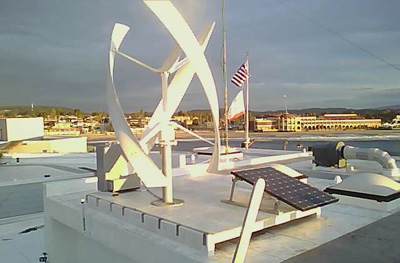A partnership between UC Santa Cruz and Hartnell College in Salinas combines UCSC's longstanding commitment to supporting underrepresented students in the "STEM" fields (science, technology, engineering, and mathematics) with new curriculum programs focused on sustainable energy and ecological design. The partnership is part of a $6 million grant from the U.S. Department of Education that includes Hartnell (the lead institution), UC Santa Cruz, and Cal State University Monterey Bay (CSUMB).
"The overall goal is to build up the pipeline for students in the STEM fields to go from community college to the university and complete a four-year degree," said Michael Isaacson, the Kapany Professor of Electrical Engineering in the Baskin School of Engineering at UCSC. "Our part involves getting students engaged in our sustainable energy programs. A lot of students are interested in sustainability, and there is also a big demand in the job market for people with technical knowledge of sustainability issues."
The Department of Education grant includes about $1.25 million for UC Santa Cruz. Isaacson, who directs the Center for Sustainable Energy and Power Systems (CenSEPS) at UCSC, will oversee the campus's participation in the program. The grant supports UCSC collaborations with Hartnell on a variety of initiatives, including curriculum development, student internships, and a new Renewable Energy Laboratory at Hartnell's Center for Advanced Technology at its Alisal campus.
The new laboratory will be similar to other CenSEPS renewable energy "microgrid" projects that UCSC faculty and students are already operating at NASA Ames Research Center and on the Santa Cruz Municipal Wharf. These projects are small-scale "test beds" for studying the technical and social challenges of implementing alternative energy sources, such as wind turbines and solar arrays, and integrating them into the power grid. Isaacson said one of the questions to be explored at the Hartnell lab is whether wind energy can be used reliably to pump water for agriculture, an application that has the potential to reduce energy costs in the Salinas Valley.
The Renewable Energy Lab will support undergraduate learning and training for faculty and teachers, in addition to research. The facility will serve as a training center for students to install and maintain technology systems, while also participating in research to develop new energy generation systems.
UCSC is also working with Hartnell College on curriculum development, building on earlier efforts funded by the National Science Foundation. The new Department of Education grant will help establish articulated pathways between the institutions, making it easier for students in STEM areas to transfer from Hartnell to UC Santa Cruz. Articulated transfer pathways will be established for all engineering fields, as well as applied physics and astrophysics.
"Hartnell has one of the best community college science programs around," Isaacson said. "We've been very impressed by their students, and we want more of them to transfer to UC Santa Cruz."
The new program, called the "STEM Regional Community College-to-University Success Program," also includes outreach from Hartnell to local high schools. It aims to increase the number of Hispanic and low-income students attaining degrees in the STEM fields by providing articulated programs that cross institutional boundaries, from high school to community college to university.
UC Santa Cruz offers several options for students interested in sustainability issues, Isaacson said. While the engineering school focuses on technical knowledge, the environmental studies track emphasizes the policy and social aspects. A "middle track" is being developed through the Sustainability Engineering and Ecological Design program, a joint collaboration between the Baskin School of Engineering and the Social Sciences Division at UCSC.
"We're trying to give our social sciences students more technical knowledge and our engineering students a better understanding of the social issues," Isaacson said. "With Hartnell, we hope that getting their students involved in our sustainability programs will encourage more of them to transfer to UCSC."



